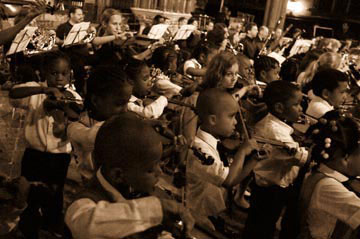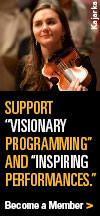January 2005
One World Symphony Donates $3,000 To Tsunami Victims
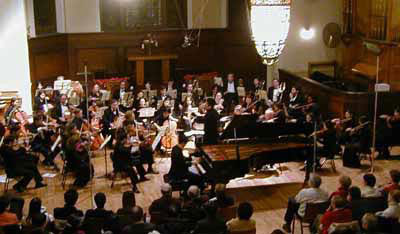 One
World Symphony recently performed two concerts in New York to benefit
the victims of the tsunami Southeast Asia and Africa. Sixty musicians
performed the music by Beethoven, Bach, Rachmaninoff, and Barber
and raised nearly $3,000, which was donated to the American Red
Cross International Response Fund for Tsunami Victims. The concert
at Good Shepherd Presbyterian Church (near Lincoln Center) was
filled to capacity with standing room only audiences, and the orchestra
received five standing-ovation curtain calls. As an encore, One
World Symphony played the "Nimrod" from Edward Elgar's Enigma
Variations.
One
World Symphony recently performed two concerts in New York to benefit
the victims of the tsunami Southeast Asia and Africa. Sixty musicians
performed the music by Beethoven, Bach, Rachmaninoff, and Barber
and raised nearly $3,000, which was donated to the American Red
Cross International Response Fund for Tsunami Victims. The concert
at Good Shepherd Presbyterian Church (near Lincoln Center) was
filled to capacity with standing room only audiences, and the orchestra
received five standing-ovation curtain calls. As an encore, One
World Symphony played the "Nimrod" from Edward Elgar's Enigma
Variations.
January 2005
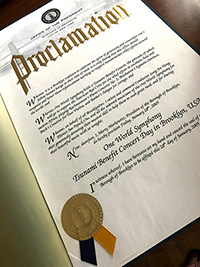 Brooklyn Borough President Proclaims One World
Symphony Day
Brooklyn Borough President Proclaims One World
Symphony Day
Brooklyn Borough President Marty Markowitz has proclaimed January 28, 2005 One World Symphony Tsunami Relief Day. The President "saluted and commended Conductor Sung Jin Hong and all the talented musicians of the One World Symphony for generously donating their musical skill to help those in such great need, and for sharing their beautiful music." The Proclamation "celebrates the spirit of generosity and concern for one's fellow human beings in their time of need." President Markowitz "recognized and honored One World Symphony for supporting humanitarian efforts around the world."
March 2005
 One World Symphony Plays New Compositions: Associated Press's feature article
One World Symphony Plays New Compositions: Associated Press's feature article
By Verena Dobnik
New York
Music News, AP
A McDonald's commercial inspired Sung Jin Hong to become a conductor -- of classical music. It wasn't a juicy burger that seduced the then-14-year-old but a girl playing a Beethoven piece on piano. Now, at 29, the Korean-born, Vienna-trained conductor leads his own orchestra in New York, called One World Symphony.
This weekend, they performed Bizet's blood-stirring, love-and-death "Carmen" before the altar of a church in Manhattan's theater district.
"This isn't the Metropolitan Opera -- please squeeze!" orchestra manager Adrienne Metzinger urged the standing-room-only audience, with spectators sitting elbow-to-elbow in the pews and on chairs set in the aisles.
This orchestra is unlike any other, starting with the unusual credentials of its composer-in-residence.
Stanley Grill not only writes some of the love songs and other pieces they play -- he also makes sure the subways and buses that bring most of the musicians to the concerts keep humming along. By day, Grill is the city Transit Authority's chief buyer, procuring the system's vehicles and the nuts and bolts that keep them running.
At night, Grill climbs up to his New Jersey attic to write music.
Each One World concert has a theme, ranging from lost love to the tsunami in Asia. A recent benefit for tsunami victims raised thousands of dollars.
The orchestra was founded in 2000 by Hong, who says his conducting echoes "a city that's full of human drama -- personal drama, relationship drama. I tell the musicians 'Close your eyes and play as if this is your last performance.'"
In an urban area with thousands of top-notch musicians vying to perform at premier halls, these fine young professionals give up higher-paying gigs to play for minimum fees. They get to perform freshly composed music, as well as the great old songs, symphonies and operas, for a grass-roots audience: Tickets are affordable to almost anyone, costing from $35 to as little as $10.
The evenings offer a sense of community: The comfortably dressed audience sits close to the musicians, with the conductor occasionally chatting between pieces ("How do you like this part played, like this?" -- they demonstrate -- "or like this?") Programs are followed by receptions, with a chance to talk with the performers over wine and hors d'oeuvres.
The ensemble is itself a sort of family. Metzinger, the manager and a soprano, is Hong's girlfriend. She also designs the group's edgy, elegant posters. They have dug into their own savings to pay some of One World's expenses, and Hong makes ends meet by teaching violin and piano.
For the next concert, in June, Grill is writing music set to "some very sexy poems," to be premiered by Metzinger, accompanied by a cello and a harp.
"There is a reason that after spending the hours I do at work, I feel compelled to spend as much time as I do writing music," says the 52-year-old transit executive. "I've never learned to accept the world we live in, with all of its unnecessary violence and stupidity. I feel compelled to work towards a world where people spend their energies learning, loving, appreciating things of beauty, helping one another and allowing each other to reach the fullest potential as human beings."
June 2005
One World Symphony Sets New Precedent By Inviting Thirty Elementary Violin Students From Harlem To Perform In Its James Coleman Young People's Concert
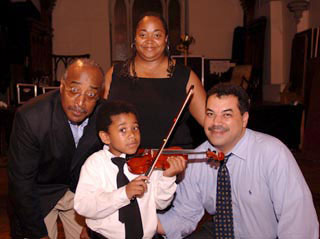 Thirty violin students from The Promise Academy in
Harlem's Childrens' Zone performed Gustav Holst's Mars from The
Planets with One World Symphony. The complete program included
Holst's The Planets, Stan Grill's world premiere Pluto,
and Jihwan Kim's world premiere orchestrations of U2's hit and
spiritual songs One, Pride, and Where The Streets Have
No Name.
Thirty violin students from The Promise Academy in
Harlem's Childrens' Zone performed Gustav Holst's Mars from The
Planets with One World Symphony. The complete program included
Holst's The Planets, Stan Grill's world premiere Pluto,
and Jihwan Kim's world premiere orchestrations of U2's hit and
spiritual songs One, Pride, and Where The Streets Have
No Name.
Many orchestras across the country present popular music to market to attract a younger audience. One World Symphony's James Coleman Young People's Concert engaged elementary violin students by inviting them to perform with the symphony. The enthusiastic and diligent students were prepared and taught by Julianne Carney and Sung Jin Hong. Around sixty professional musicians and thirty elementary students performed in memory of One World Symphony's principal violist James Coleman (1972-2005), a generous humanitarian, vibrant personality, promising songwriter, passionate musician, and wonderful friend.
